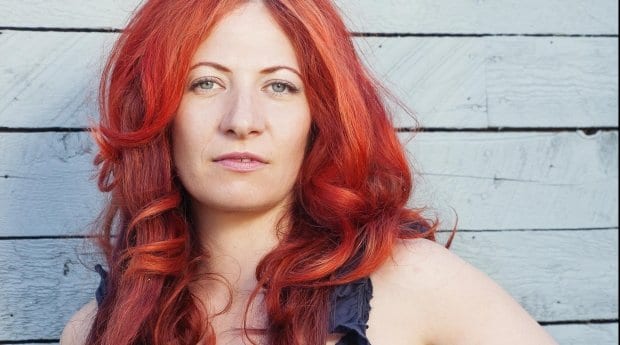Full disclosure: this review of Vancouver writer Amber Dawn’s debut poetry collection, Where the Words End and My Body Begins, might sound like fanmail because I am going to gush a bit. More disclosure: Amber Dawn and I have been friends since we were baby-dykes in the mid-1990s making handmade zines on photocopiers.
Final disclosure: as I finished reading her manuscript, I wrote her to ask how her day was and Amber Dawn replied: “Really chill. Did laundry, cleaned the house,” which was a disappointingly banal response from someone I just decided is a genius. It’s a funny feeling to be in awe of my best friend, someone I’ve known more than half my life, but that’s what it felt like to read this book.
I think Amber Dawn will approve of all my disclosures because revelation is something she does so well. In this collection, she reveals much about how art can help us rise from the ashes of trauma, whether what we know is addiction, abuse or the cost of being unapologetically queer.
The poetry collection is a series of glosa poems, a 15th-century Spanish poetic form I hadn’t even heard of before opening this collection. A glosa pays tribute to another poet’s work. Each glosa begins with four lines from another poet, which Amber Dawn then works into her own poem. It’s kind of the poet’s equivalent of a cover song. Done poorly or with little imagination, a cover song just sounds like competent karaoke. When done well, a cover song reveals something about the original song and the new artist.
The artists quoted here are queer, gender-creative, feminist, and/or survivor spectrum writers past and present. From classic icons like Adrienne Rich to Vancouver’s own Poet Laureate Rachel Rose, the list of glossed poets is a who’s who of courageous, transgressive writing curated by Amber Dawn.
The subjects covered in Where the Words End and My Body Begins will not be a surprise to those who have read Amber Dawn’s other books. Like her memoir How Poetry Saved My Life: A Hustler’s Memoir, which won the City of Vancouver Book Award in 2013, this new collection is what she refers to in her introduction as “survivorship verse.”
From detox to fisting, Amber Dawn writes with a sure and grounded voice that often holds humour right along with violence, as in “A Group of Sluts is Called What?” where she laments how dated her desire feels in this quickly changing world: “The internet is a boner killer/everyone watches gang bangs from home/and the Kitten Theatre is now a Pottery Barn.”
Fans won’t be surprised by the unapologetically queer “The Revered Femme Bottom,” but man, I wish I could be a fly on the wall when the selection committee for this year’s Governor General’s Award for Poetry cracks the spine of this book. And they will have to, it is that good. And when they read “Your scalp confessed to a Bic razor/ You made anger your order/ When you pronounced your cunt a warrior the daddies/ trained their mad eyes on you,” their jaws will drop.
“We are not an easy-answers bunch,” Amber Dawn says in her opening essay. You don’t have to be her best friend to feel part of that “we” — part of a queer community where our most honest statements might be called coarse if they weren’t so well crafted and true. You just have to read the book.
Amber Dawn’s books can be purchased from her publisher Arsenal Pulp Press.
In Vancouver, her book launch will take place Wednesday, April 29 at the Real Vancouver Writers’ Series at 8pm at Havana, 1212 Commercial Dr. Tickets $8 in advance/$10 at the door.

 Why you can trust Xtra
Why you can trust Xtra


